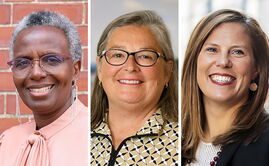
Amplifying voices: Chamber, businesses, community groups build diversity resources
 Photo / Tim Greenway
Adilah Muhammad, president and founder of the Third Place, says networking opportunities help BIPOC employees find a community in Maine.
Photo / Tim Greenway
Adilah Muhammad, president and founder of the Third Place, says networking opportunities help BIPOC employees find a community in Maine.
Sometimes, the most powerful thing you can do is pass the microphone to someone else.
When Maine businesses and the Portland Regional Chamber of Commerce looked to make the next steps in their diversity, equity and inclusion efforts, they realized they needed to listen to the voices of the communities they wanted to better serve.
“We don’t have to create something from scratch. We have to empower the people who are already doing great work and give the microphone and the resources to them,” says L.L.Bean CEO and president Steve Smith.

Smith, along with Michael Simonds, chief operating officer of Unum Group (NYSE: UNM), were among the leaders of the business community who worked with dozens of corporate CEOs and the Portland Regional Chamber of Commerce over the past two years to make progress in promoting and supporting diversity in Maine.
They also are helping create the next steps to greater networking opportunities and internships for communities of color throughout Maine.
“My job was to be at the back, support the work and lift up the people and the communities and the great work already being done. My job is to serve,” Simonds says.
Since the deaths of George Floyd, Ahmaud Arbery and Breonna Taylor and the national outcry that followed, the Portland chamber and Maine businesses have been actively trying to respond.
The first year, more than 400 companies publicly signed a statement in solidarity against racial and social injustice, and more than 1,500 people took part in training in a 21-day challenge to provide education on topics such as race, power and privilege.
While some companies and communities might have stopped there, the Maine business community clamored for more work and action.
Next steps
Over the past year, the chamber and about two dozen business leaders have worked with a facilitator, Beyond Racial Equity, to create a plan for the next steps to encourage and promote diversity.
Among the plan’s steps, Maine businesses will work with existing groups in the Black, indigenous, people of color communities to create networking opportunities for diverse employees to help them find peers and support throughout Maine, as well as create internships for high school and college students of color to work at local companies.
“The fact that all the business leaders showed up and worked on this shows how important it is. It’s right for our businesses, it’s right for society, our community and the world,” Smith says. “Business leaders have power and a platform and we can use that power for good. It will be for the BIPOC community to judge if we’re successful.”

“Collectively, as a community, we have people who can work together to amplify the groups that are already doing good work and combine our efforts to find new ways to serve those communities,” Quincy Hentzel, president and CEO of the Portland Regional Chamber of Commerce.
“The business community won’t solve all the problems on its own, but it can help do its part and show support.”
The Third Place, a coworking and community space for Black entrepreneurs and emerging leaders, and ProsperityME, which helps immigrants and refugees gain financial stability, are among the groups now working with the chamber and business community.
“We are trying to change a culture that has existed forever,” says Claude Rwaganje, founder and executive director of ProsperityME. “Most businesses in Maine are family businesses. That does not entice many who are outsiders. The fact that other companies in Maine are trying to change and there is momentum for change, I say ‘Hallelujah.’”

The business community will hold BIPOC networking events with the Third Place and ProsperityMe so the BIPOC employees of several organizations can get together, find a community and support each other.
“We’re offering a social safety net that supports people,” says Adilah Muhammad, president and founder of the Third Place. “Networking offers a way to organize the community when there’s not a strong, obvious cultural infrastructure in place.”
“BIPOC people leave Maine because of the lack of social opportunities outside of work. There’s no amount of money you can pay to make someone stay if they don’t have a community or feel at home,” Muhammad says.
“Some of the best recruiters of BIPOC employees are the BIPOC employees already in the workforce. The more opportunities there are for networking and socializing, the more people feel at home and want to be here and work here.”
“Maine is in a unique place. Maine is growing in diversity at a time when people are more accepting of diversity. Maine is at a really good place to make things right. The hope is that with increased levels of dialogue, as the community is emerging, workplaces will be able to receive the shift,” Muhammad says. “The fact that the chamber has put top leadership behind this is a significant show of support and strength.”
Workforce development efforts
The business community also is creating more internship opportunities for high school and college students of color.
This summer, the pilot program of internships will place about 10 students of color at MEMIC, Unum, MaineHealth, Bangor Savings and others. The goal is to double the number of internships next year.
“There were more internship offers available than there were students to fill them. The generosity of the business community was overwhelming. We now need to do more outreach to talk to more students and get them to apply,” says Tae Chong, director of multicultural markets and strategies for the Maine State Chamber of Commerce, which is working with the Portland chamber on the initiative.
“It’s all about the circle of influence for these students. No one in their community really ever applied for an internship before so they don’t know what it means or how it can help,” Chong says. “We’ve got to take a chance and work a little harder to entice these kids because they’re going to be the first and the brave go-getters.”
Chong says he worked with students at Southern Maine Community College and University of Southern Maine to encourage them to apply. The hope is that if a student makes connections at a Maine company, they will want to stay here after graduation.
“The number one indicator of someone wanting to stay someplace is whether they have good support and good experience. It helps with workforce development,” Chong says. “It all comes down to relationships and how well someone’s known. Getting the business community to know this population better allows an avenue for relationships to be made.”
Other efforts being made include sharing DEI training and education programs created at some of Maine’s largest corporations such as Unum, Hannaford, WEX and L.L.Bean with any business that wants to learn from them.
The Portland chamber also plans to bring on a consultant to be a project manager to make sure the DEI goals are being met.
As part of that, the chamber aims to raise $300,000 to help with the internships, boost the networking efforts for the Third Place and ProsperityME and pay for the DEI consultant. Already half of that fundraising has been achieved, Hentzel says.

“The importance of this work cannot be overstated. This broadens the scope of people who would come here and want to continue to grow the state and improve the state. People are our number one priority. Full stop,” says Simonds. “The power is in the hands of the worker, which is great. We want to create really powerful and inclusive environments where the worker wants to be, and thrive and grow.”
Simonds says the DEI efforts also make great business sense.
“Our businesses may be in Maine, but our customers reach across the U.S., which is diverse and changing. A company is not going to be successful if they’re not sensitive to the diversity of thought, ideas and desires of their employees and customers,” Simonds says. “We want firms in Maine that are serving more than Maine.”













0 Comments